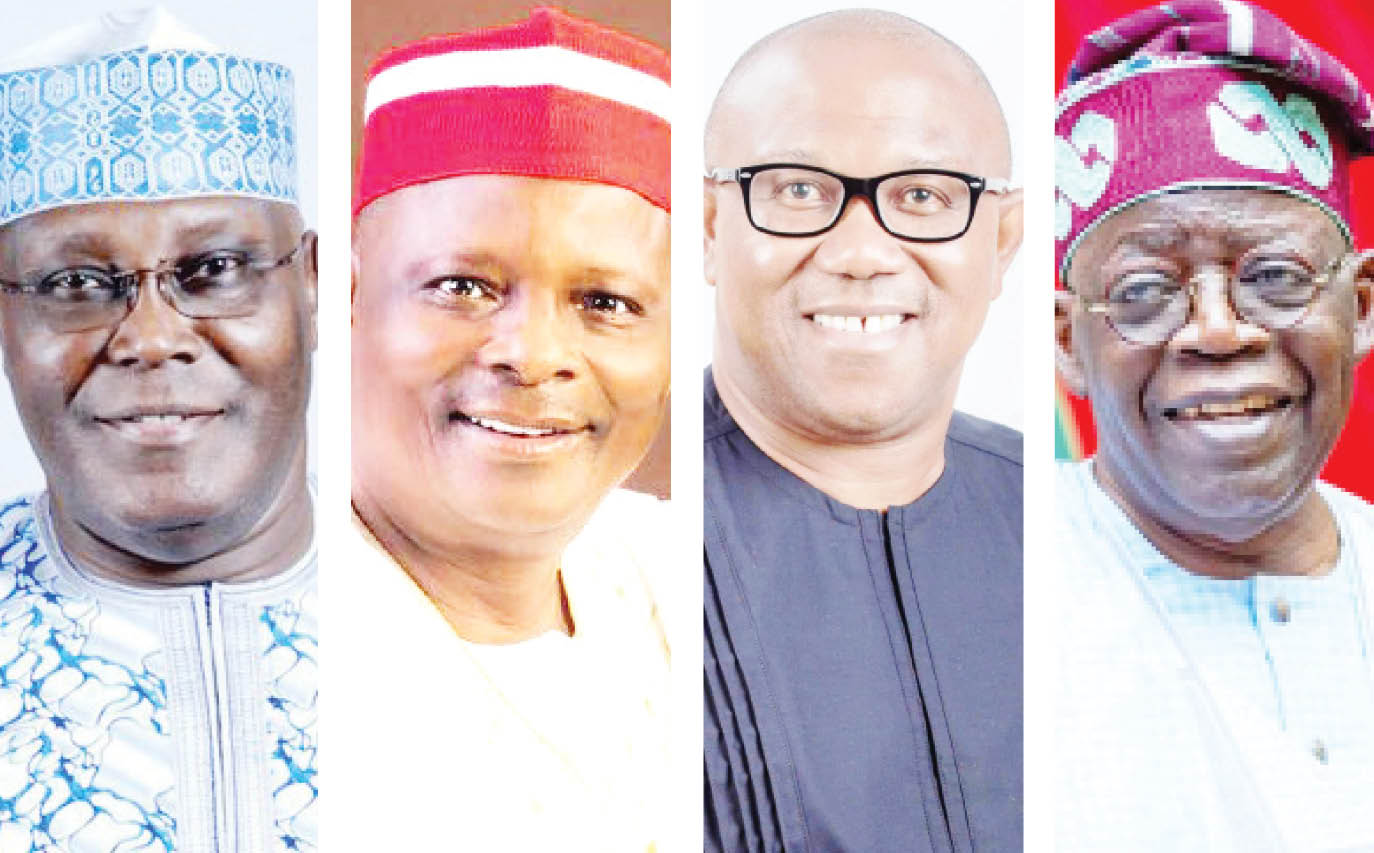2023: What presidential candidates must do now
Panellists, discussants and participants at the 20th Daily Trust Dialogue, which was held on Thursday, January 26, 2023, voiced out aloud the major fears many have harboured privately about the 2023 general elections, scheduled for next month. For the discerning mind, the frontline presidential candidates are now engaged in mudslinging, dirty tricks, stoking ethnic and […]

Atike, Kwankwaso, Obi & Tinubu
Panellists, discussants and participants at the 20th Daily Trust Dialogue, which was held on Thursday, January 26, 2023, voiced out aloud the major fears many have harboured privately about the 2023 general elections, scheduled for next month. For the discerning mind, the frontline presidential candidates are now engaged in mudslinging, dirty tricks, stoking ethnic and religious fire from North to South, throwing wealth around, and choreographing spent electoral strategies, to win the forthcoming elections.
But none has enunciated convincing strategies for tackling the multiple and hydra-headed challenges or evils besetting the country.
The dialogue, with the theme ‘Interrogating the 2023 Presidential Agenda’, had as its chairman the Archbishop Emeritus of the Catholic Archdiocese of Abuja, John Cardinal Onaiyekan, and Royal Father of the Day, the Sarkin Karshi, Abuja, His Royal Highness Alhaji Ismaila Mohammed. The panellists were made up of brilliant minds from across the country.
The speakers’ assessment of the manifestos and campaign speeches of the leading presidential candidates, including Bola Ahmed Tinubu of the All Progressives Congress (APC), Atiku Abubakar of the Peoples Democratic Party (PDP), Peter Obi of the Labour Party (LP) and Rabiu Musa Kwankwaso of the New Nigerian Peoples Party (NNPP), proved that none of the candidates has clearly articulated how they would tackle the problems in the country. Insecurity remains a major challenge in some parts of the country; poverty plagues more than a half of the population; unemployment has created a ready-made army for criminality, and the education system has literally collapsed.
- Brain drain: Nigeria may end up without doctors – NARD
- Repair work begins on derailed Abuja-Kaduna rail
These candidates have not provided a framework for dealing with the country’s economic crises, in the nature of uncontrolled inflation; loss of revenues from the oil sector due to oil theft; mounting local and external debts; death of the industrial sector; the devaluation of the naira to the point that it has lost its status as store of value; and the general frustration that has made it fashionable for highly-skilled Nigerian youths to migrate to Europe and America, instead of using their skills to build the country.
And instead of using their rhetoric to convince Nigerians that they have the strategies and capacity to deal with these existential problems, our front-line presidential candidates, through their activities, present themselves as mere jesters and manipulators of the people in order to grab the big prize and gain access to the country’s resources.
Professor Jibrin Ibrahim of the Centre for Democracy and Development (CDD), was apt when he described the manifestos of the candidates thus: “The manifestos for these elections are of extremely high quality, the analysis of the economy and society is very thorough, the propositions are very good and the three key issues being addressed are issues that have been with us since the Jonathan administration… But which of these parties has a clear vision?” No doubt, none of them has it. Professor Ibrahim’s observation was complemented by that of Dr Yetunde Anibaba of the Lagos Business School, who put the situation quite succinctly, by saying, “These manifestos are excellently written academic works, until they start to take action.” Of course, the manifestos are not written by the presidential candidates; they were written by intellectuals who may never be involved in their implementation. Perhaps, even the candidates have not read the manifestos, so they may not be able to communicate how to implement them to the crowds they meet as they campaign from one part of Nigeria to another.
The danger that confronts the nation as we march to the polls under this atmosphere is that, if elected, these politicians may fail at the huge task of repositioning Nigeria, just as previous administrations, like that of Goodluck Jonathan and now outgoing President Muhammadu Buhari, have been adjudged as having performed far below the expectations of Nigerians. The quality of life in the country has continued to worsen from one administration to another. If nothing drastic is done, the country may not escape this frustrating experience in the next dispensation.
As the electioneering campaign continues, we urge Nigerians to ask candidates for the presidential, governorship and legislative elections to provide pragmatic strategies for dealing with the predicaments we face as a country. Political rhetoric that does not provide believable solutions to our problems should be discarded. The political actors must also use the remaining weeks to state clearly their plans for the nation and how they hope to achieve each and every one of them. They must do away with insults and face the real issues. That they continue to attack one another with issues that do not count is actually an insult to the sensibilities of Nigerians.
From all indications, the Independent National Electoral Commission (INEC) is poised to conduct credible elections, meaning that votes would count, we urge the institution to remain on that track. Nigerians must also vote wisely, by casting their ballots for candidates who have convincing strategies and passion for tackling the country’s problems.
